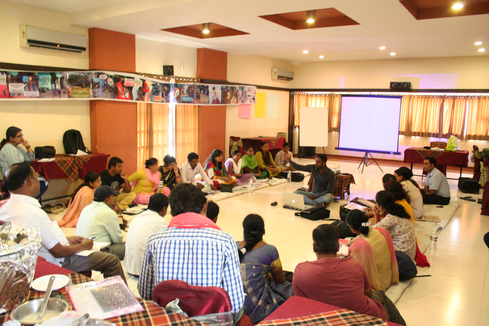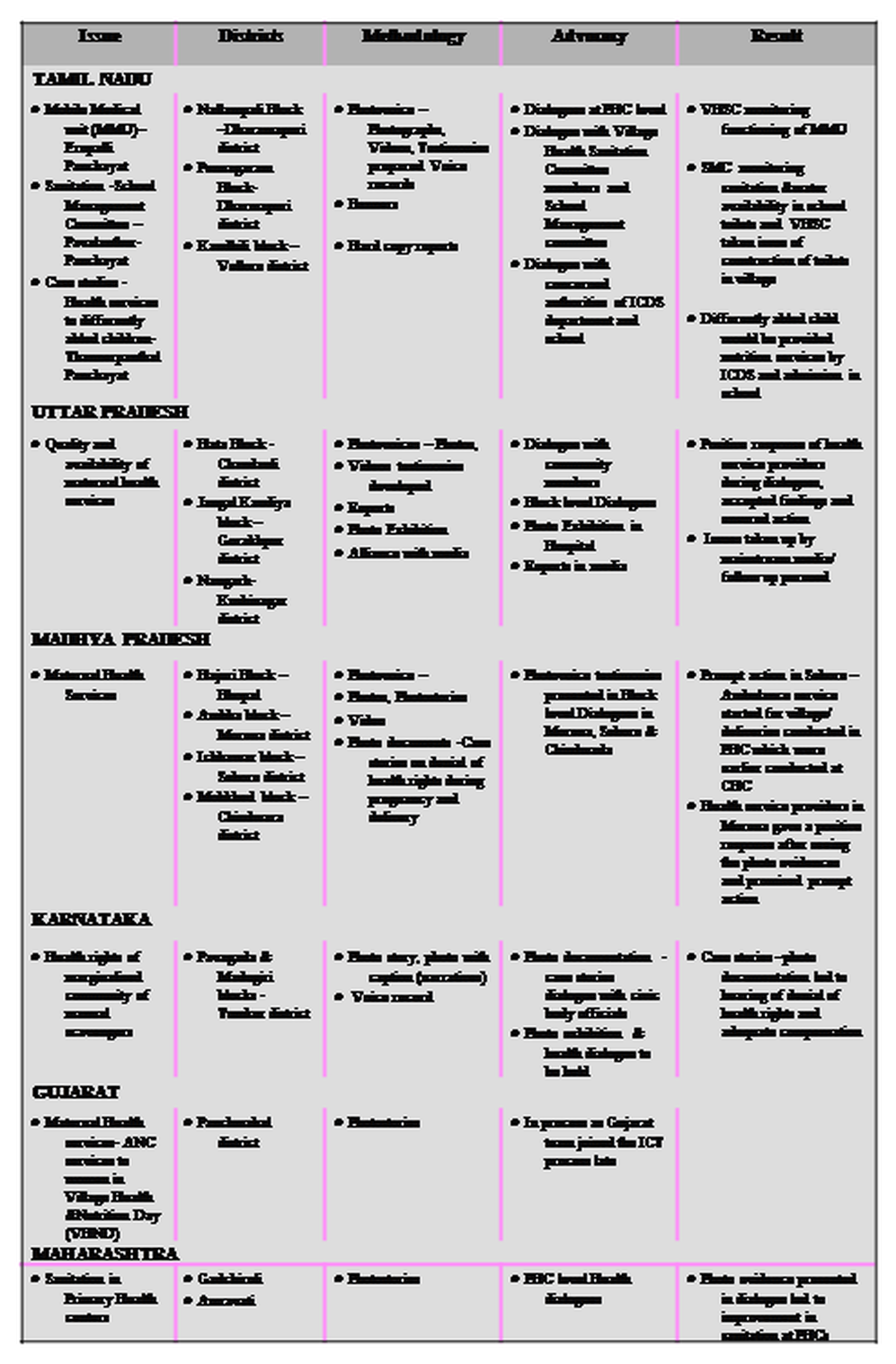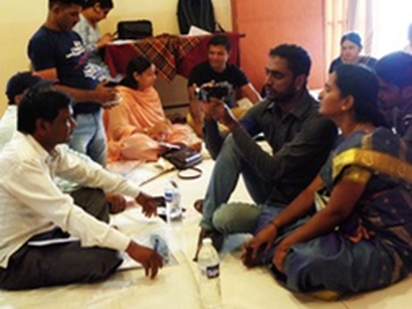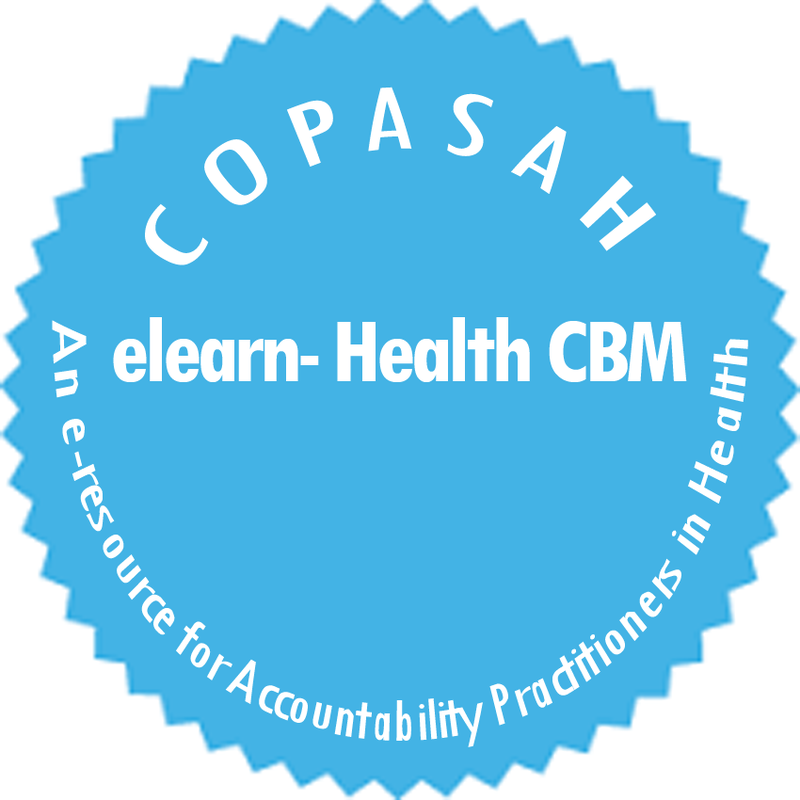
|
|
Employing ICT for Social Accountability:
COPASAH South Asia Initiative
COPASAH South Asia Initiative
A Short report on COPASAH South Asia Learning, Sharing and Documentation workshop
|
Surekha Dhaleta, Deepak Kumar
|
|
Background
Community of Practitioners on Accountability and Social Action in Health (COPASAH) is a global community platform of practitioners in the field of health and human rights. The community uses tools of community monitoring for accountability and health rights. Health and human rights practitioners from across different regions of South Asia, East- Southern Africa, Latin America and parts of Central Europe interact regularly. They exchange experiences and lessons from the field, share resources, capacities and innovative methods in accountability and knowledge products. Since its genesis in 2011, COPASAH has emerged as a strong ‘community of practice’ which focuses upon accountability practices which are community driven and citizen centric and strive for empowerment of communities wielding increased negotiating power, with an enhanced realization of health rights. Concept and Objective COPASAH has taken cognizance of the digital divide that has been a major barrier for the grassroots practitioners in the developing countries who fail to use the evidences effectively to influence change for the benefit of the |
Practitioners receiving tips on Videography
|
marginalized. Recognizing the significance of Information Communication Technologies (ICTs) in citizen engagement for monitoring, evidence gathering, gap analysis and advocacy in health service delivery, measuring change in empowerment process of communities in demanding quality health care, COPASAH has experimented with the use of ICTs in social accountability.
In this vein of nurturing, strengthening, promoting collective knowledge and skills; developing and implementing peer led learning strategies of ICT methodologies in social accountability, COPASAH convened a three day COPASAH- South Asia Sharing and Documenting Information Communication Technologies workshop at Vadodra in Gujarat (India) from July 2-4, 2015 in association with CHSJ and SAHAJ. The workshop saw a congregation of 32 community practitioners from six states of India including Tamil Nadu, Karnataka, Uttar Pradesh, Madhya Pradesh, Gujarat and Maharashtra where the practitioners were involved in sharing and learning experiences of using ICT for social accountability in health. The aim of the workshop was to document the learning experiences i.e. the methodology, processes and challenges in the practice of employing ICT for social accountability in health. The workshop also endeavoured to equip practitioners with basic skills of film/video making apart from strengthening the network of practitioners in South Asia as well creating solidarity with other resource groups in the field of ICT and social accountability.
Backdrop of the Workshop
Capacity building of 30 community level health accountability practitioners from the aforementioned six states was done using accessible technology like cameras in cell -phones, basic digital cameras on how to take photographs, make photostories and record voices for identifying gaps in health care services and generate evidence for advocacy of health rights in two successive workshops respectively in January and April, 2015. Subsequent to these workshops the practitioners developed an action plan to generate evidence using accessible technology in 18 districts on selected themes of women’s health and those of marginalised communities for accessing free health services and health rights. Photo documented evidences as Photostories/Photovoices on gaps and situation in the health facilities and services were collated, reviewed and shortlisted in collaboration with community members and were used for advocating with concerned health officials and committees related to grievance redresses through public health dialogues at various levels of health system. These photo documented evidences were created as Audio Visual products. ¹
In this vein of nurturing, strengthening, promoting collective knowledge and skills; developing and implementing peer led learning strategies of ICT methodologies in social accountability, COPASAH convened a three day COPASAH- South Asia Sharing and Documenting Information Communication Technologies workshop at Vadodra in Gujarat (India) from July 2-4, 2015 in association with CHSJ and SAHAJ. The workshop saw a congregation of 32 community practitioners from six states of India including Tamil Nadu, Karnataka, Uttar Pradesh, Madhya Pradesh, Gujarat and Maharashtra where the practitioners were involved in sharing and learning experiences of using ICT for social accountability in health. The aim of the workshop was to document the learning experiences i.e. the methodology, processes and challenges in the practice of employing ICT for social accountability in health. The workshop also endeavoured to equip practitioners with basic skills of film/video making apart from strengthening the network of practitioners in South Asia as well creating solidarity with other resource groups in the field of ICT and social accountability.
Backdrop of the Workshop
Capacity building of 30 community level health accountability practitioners from the aforementioned six states was done using accessible technology like cameras in cell -phones, basic digital cameras on how to take photographs, make photostories and record voices for identifying gaps in health care services and generate evidence for advocacy of health rights in two successive workshops respectively in January and April, 2015. Subsequent to these workshops the practitioners developed an action plan to generate evidence using accessible technology in 18 districts on selected themes of women’s health and those of marginalised communities for accessing free health services and health rights. Photo documented evidences as Photostories/Photovoices on gaps and situation in the health facilities and services were collated, reviewed and shortlisted in collaboration with community members and were used for advocating with concerned health officials and committees related to grievance redresses through public health dialogues at various levels of health system. These photo documented evidences were created as Audio Visual products. ¹
Snapshot of Use of ICT for Social Accountability across States
Proceedings
Advancing from the experiences of the two earlier workshops and experiment of use of ICT in the field, the six teams shared their experiences in the three day Vadodra workshop. The state team members made presentations revolving around the context of the place where ICT was used, the detailed processes- on how and which issue was selected, and the kind of ICT was used, how community members were involved in the process. Each team discussed the production process- in detail i.e. how photographs/videos were taken, the conceptualisation of photostories/ photovoices etc. and also demonstrated the dissemination-advocacy process, responses from health service providers, besides focusing on outcomes and challenges.
Advancing from the experiences of the two earlier workshops and experiment of use of ICT in the field, the six teams shared their experiences in the three day Vadodra workshop. The state team members made presentations revolving around the context of the place where ICT was used, the detailed processes- on how and which issue was selected, and the kind of ICT was used, how community members were involved in the process. Each team discussed the production process- in detail i.e. how photographs/videos were taken, the conceptualisation of photostories/ photovoices etc. and also demonstrated the dissemination-advocacy process, responses from health service providers, besides focusing on outcomes and challenges.
- It discerned from the sharing by the teams that the states had experimented with the use of Photovoice under COPASAH’s initiative for the first time.
- The findings indicated that audio- visual documentation drew the attention of the heath authorities prompting them to problem solving action. The visual report cards were effective in generating awareness in the community with low literacy. The community strategically used evidence to communicate with providers at various levels of health system. It led to building greater visibility of issues related to maternal and child health through social media/ press releases and women and marginalized community members demanding quality health care services.
- It emerged from the discussions that community members were enthusiastic to take photos and community can handle technology and work towards generating evidences for health gaps but community members were not much involved in analysis, review, selection and conceptualization of photostories. It surfaced from all the states that relative to traditional report cards in Community Based Monitoring (CBM), photovoices emerged to be strong medium of reflecting gaps in delivery of health services and health rights denials.
- All the practitioners outlined that short time interval was a limiting factor in the process of carrying out the initiative.
|
Practitioners learning how to use video camera
|
Reflections for Further Deliberations
COPASAH Steering Committee member, Renu Khanna who was the co-facilitator in the workshop reflected that deliberations were required on some points on use of ICT for social accountability. She noted that the practitioners need to understand the nuances of modes of testimonies i.e. testimonies as shared in person in Jan Samwads (health dialogues) relative to testimonies presented through films/videos or through photos. She said that it was evident from the shared experiences of the practitioners that Photovoice methodology is useful, but practitioners need to cull out from the experiences, what has been a value addition of ICT in CBM while involving local community members. COPASAH coordinator, E Premdas Pinto noted that the practitioners had actively pursued the COPASAH initiative of using ICT for social accountability; however he cautioned that the idea of community should not be romanticized. It should be realized that the bottomline of the CBM is community and empowerment. It should be gauged that who is closest to the community i.e the grassroot practitioner and these grassroots practitioners should be involved intensively in the bottom up approach of CBM. |
Skill Building on Video Making and Editing
The second day of the workshop focused on skill building of the practitioners on video making and video editing. The practitioners learnt about nuances of video/film making under supervision of independent filmmaker Vijay Kumar and deliberated upon how to choose a theme, prepare for an interview, how to take shots, techniques employed while taking shots along with editing videos. The practitioners were divided into four groups for practical session on making videos, wherein the groups explored the city of Vadodra by making videos on selected themes.
Interaction with Video Volunteers
On the third day of the workshop, practitioners interacted with representative of Video Volunteers (VV), Kanika Singh. She briefed on the ways, VV is working towards empowering voices and training community members as community correspondents wherein members of the disadvantaged community are imparted with story and data gathering skills. Bipin Solanki, Community Correspondent (CC) with VV in Gujarat, elaborated that as a CC he was able to highlight issues related to denial of rights of marginalised communities. Representatives of VV expressed their keenness to forge an alliance with COPASAH in raising the voice of the margianlised communities.
Way Forward
Following intensive discussions on the experience of using ICT for social accountability, the six teams collectively reflected upon how to take the learnings forward on use of ICT for social accountability and outlined their expectations from COPASAH. The practitioners decided that they would use the skill of video making to develop video testimonies on health right gaps and use them for advocacy at different levels of health system.
Many grassroot practitioners opined that it was their first hand experience in handling video cameras and engagement with editing software.
The practitioners also reflected that a continuous engagement and handholding in terms of technical support on editing and on use of ICT for social accountability was required from COPASAH to take the initiative ahead. It was mooted and agreed under the facilitation of COPASAH coordinator, E.Premdas and COPASAH SC member; Renu Khanna that COPASAH would be providing technical support to the practitioners. As a step ahead, it was proposed that the teams would deliberate on the action plan developed at the workshop and develop proposals on the basis of the discussions and then take it forward with COPASAH.
Conclusion
Convergence of practitioners from diverse states at the three day workshop turned out to be an interactive avenue, as it enabled discussions and consolidation of understanding on use of ICT in social accountability. It provided an opportunity to work out ways for enriching communication between practitioners, COPASAH and Video Volunteers also.
The second day of the workshop focused on skill building of the practitioners on video making and video editing. The practitioners learnt about nuances of video/film making under supervision of independent filmmaker Vijay Kumar and deliberated upon how to choose a theme, prepare for an interview, how to take shots, techniques employed while taking shots along with editing videos. The practitioners were divided into four groups for practical session on making videos, wherein the groups explored the city of Vadodra by making videos on selected themes.
Interaction with Video Volunteers
On the third day of the workshop, practitioners interacted with representative of Video Volunteers (VV), Kanika Singh. She briefed on the ways, VV is working towards empowering voices and training community members as community correspondents wherein members of the disadvantaged community are imparted with story and data gathering skills. Bipin Solanki, Community Correspondent (CC) with VV in Gujarat, elaborated that as a CC he was able to highlight issues related to denial of rights of marginalised communities. Representatives of VV expressed their keenness to forge an alliance with COPASAH in raising the voice of the margianlised communities.
Way Forward
Following intensive discussions on the experience of using ICT for social accountability, the six teams collectively reflected upon how to take the learnings forward on use of ICT for social accountability and outlined their expectations from COPASAH. The practitioners decided that they would use the skill of video making to develop video testimonies on health right gaps and use them for advocacy at different levels of health system.
Many grassroot practitioners opined that it was their first hand experience in handling video cameras and engagement with editing software.
The practitioners also reflected that a continuous engagement and handholding in terms of technical support on editing and on use of ICT for social accountability was required from COPASAH to take the initiative ahead. It was mooted and agreed under the facilitation of COPASAH coordinator, E.Premdas and COPASAH SC member; Renu Khanna that COPASAH would be providing technical support to the practitioners. As a step ahead, it was proposed that the teams would deliberate on the action plan developed at the workshop and develop proposals on the basis of the discussions and then take it forward with COPASAH.
Conclusion
Convergence of practitioners from diverse states at the three day workshop turned out to be an interactive avenue, as it enabled discussions and consolidation of understanding on use of ICT in social accountability. It provided an opportunity to work out ways for enriching communication between practitioners, COPASAH and Video Volunteers also.
¹An AV product representing each state (in form of Photostory) has featured in the 10th issue of COPASAH Communiqué. These can be accessed at : http://www.copasah.net/uploads/1/2/6/4/12642634/innovative_use_of_ict_in_community_based_monitoring_practice_in_india.pdf
ABOUT AUTHORS
Surekha Dhaleta,is a team member of COPASAH communication hub and also supports the COPASAH global secretariat team. Apart from coordinating the Communiqué with the team she coordinates some of the communication platforms of COPASAH- COPASAH listserv, social media (facebook, twitter) and COPASAH blog. She is associated with the Public Health Rights and Accountability (PHRA) team at CHSJ. She has experience in public health and journalism.
Deepak Kumar works with the Public Health Rights and Accountability (PHRA) team at CHSJ. He is also coordinating the ComAct4Health_India listserv for regional social accountability practitioners in India.
Surekha Dhaleta,is a team member of COPASAH communication hub and also supports the COPASAH global secretariat team. Apart from coordinating the Communiqué with the team she coordinates some of the communication platforms of COPASAH- COPASAH listserv, social media (facebook, twitter) and COPASAH blog. She is associated with the Public Health Rights and Accountability (PHRA) team at CHSJ. She has experience in public health and journalism.
Deepak Kumar works with the Public Health Rights and Accountability (PHRA) team at CHSJ. He is also coordinating the ComAct4Health_India listserv for regional social accountability practitioners in India.










